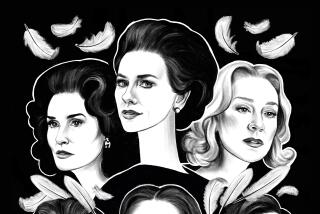It took magic
CANNES, FRANCE — Terry Gilliam went to the movies the other night, and this is what he saw. “Trailers from ‘Transformers,’ ‘G.I. Joe,’ ‘Harry Potter’; they all had the same explosions, the same sound mix, the same rhythms, it was all the same film,” the director says, still not quite believing it. “Hollywood’s been doing this for 20 years. When’s it going to end?”
It ends right here and now at Cannes’ Festival du Film, where Gilliam’s “The Imaginarium of Doctor Parnassus,” a work as exceptional and unusual as its title, premieres out of competition today. A tale of good and evil battling for souls that’s made with Gilliam’s fantastic and fantastical visual imagination, “Imaginarium” is the director’s best, most entertaining film in years.
“Imaginarium” is also perhaps the most anticipated film of the festival because it’s the one Heath Ledger was working on when he died in January 2008, the one that ends with the on-screen credit “A Film From Heath Ledger and Friends” because colleagues Johnny Depp, Jude Law and Colin Farrell pitched in to finish it.
More unusual still, the structure of “Imaginarium” and the nature of what was left to shoot when the actor died made the use of those substitute actors so seamless that, Gilliam said, “the postproduction sound guy assumed it had been written that way.”
It’s no wonder, then, that Gilliam feels that he “didn’t make this film. Forces from above and below made it. It made itself. I don’t panic anymore. It’s got its own relentless momentum. It just needed some human sacrifice.”
Gilliam means not just Ledger but producer William Vince, who died a few months after the actor, as well as the director himself, who was hit by a car and broke his back. “They were going for the trinity,” he says with his trademark take-no-prisoners sense of humor. “That would have been a tidy end to the whole thing. But they didn’t kill me. I’m stuck here to tell the tale.”
Gilliam, who co-wrote the script with Charles McKeown, described the film as “my ‘Fanny & Alexander,’ my ‘Amarcord.’ I went back to the things I’m really good at.”
And like Dr. Parnassus, the title character played by Christopher Plummer, Gilliam “was being frustrated, trying to amaze people and they’re not paying attention. So the film became autobiographical in that sense.”
Dr. Parnassus, it turns out, is a centuries-old traveling conjurer with a beautiful young daughter who tours around modern London in an astonishing ancient show wagon doing battle for souls with Mr. Nick, the prince of darkness, wonderfully played by Tom Waits. (“He was born for the part, his music is dark but tender,” Gilliam says.)
The heart of the doctor’s show is a magic mirror that allows those who go through it to experience another dimension of their own minds. That device, Gilliam says, was partly because of a purely pragmatic decision on his part. “I knew I didn’t have the money to compete with the big effects films,” he explains. Plus, “once you get into the world the effects create, that becomes normal, so you end up doing all this work for just normality. With a magic mirror, you can come back out before you spend too much money.”
Ledger’s character, Tony, is a hustler of uncertain morality who joins the show, in one of the film’s many unsettling references to death, after he is nearly hung. Ledger, who had worked with Gilliam in “The Brothers Grimm,” was watching the director explain some storyboards when, “in the middle of this, he slipped me a note that read: ‘Can I play Tony?’ ”
“People don’t know how brilliant he was. He was limitless. Anything you threw at him he could handle,” Gilliam says of the actor, still not resigned to his death. “When we heard, my first response was that it was a P.R. stunt for his role as the Joker. [His death] didn’t make any sense. Even now it doesn’t compute.”
Gilliam’s initial thought at that point was “the film’s over, we go home now. But my team, they beat me up, they wouldn’t let me give it up. But I didn’t think it was right to just get another actor.” Because it was three fantasy scenes that remained to be shot, Gilliam decided on three actors, all friends of Heath. Though some rewriting and changes of shooting plans were necessary, it all went surprisingly smoothly.
“Having a magic mirror,” the director says, “makes a lot of difference.”
The first call Gilliam made was to Depp “because Johnny’s a mate, direct and genuine. He loved Heath, and he said, ‘I’m in, whatever.’ ” Then the problem became getting schedules to mesh. “Then Michael Mann’s film (‘Public Enemy’) was delayed a week. I don’t think Johnny told Michael he was going. My guess is that he snuck out.”
Law, one of Gilliam’s early choices for the part, agreed next, and Los Angeles casting agent Margie Simkin suggested Farrell after she saw him at an L.A. memorial service. “All the actors already in the film had to change their schedules, and there wasn’t a moment’s hesitation,” Gilliam explains. “They all said, ‘We’ll do what’s necessary.’ It’s really a love letter to Heath by everybody involved. He was beloved by so many.”
Gilliam likes to joke, if asked what the film is about, that “it’s about making marketing people work very hard,” and he worries that being smart and entertaining in a dumbed-down world is going against the grain. “People are smart if you get their attention the right way,” he says. As one of his characters puts it, “this world is full of enchantment for those with eyes to see.” Nothing rewards those eyes as richly as this remarkable film.
--
More to Read
Only good movies
Get the Indie Focus newsletter, Mark Olsen's weekly guide to the world of cinema.
You may occasionally receive promotional content from the Los Angeles Times.










